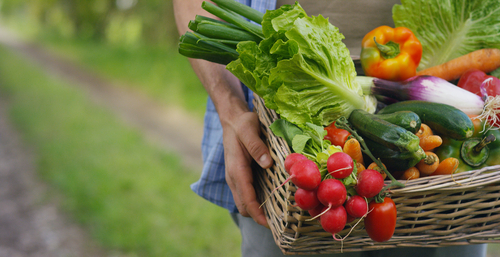
Ukraine is among the 20 countries in the world with the largest land bank for organic production. The Ukrainian market for organic products therefore has enormous potential, but development is hampered by the lack of effective regulation of the industry. The relevant Law has not yet been put into practice, and as a result no domestic producer is certified under Ukrainian legislation, meaning that many products get away with falsely claiming to be organic.
Ways of solving these problems were discussed by representatives of the authorities, business and expert circles during a regional round-table meeting in Lutsk on ‘Organic production: new opportunities for SMEs and sustainable rural development’, organised by the Better Regulation Delivery Office (BRDO) with the support of the EU4Business / FORBIZ project within the framework of the Public Dialog #PRODialog.
As a first step forward, the state adopted the ‘Concept of the development of farming’ in September, which determines the priority of the development of organic production and introduces local targeted support programmes, in particular in the Volyn, Zhytomyr and Chernihiv regions. The purpose is to stimulate the transition of farms to the production of organic produce.
Incentive programmes
Opening the event, the First Deputy Chairman of the Volyn Regional State Administration Alexander Stepantsov noted: "Agriculture is one of the priority sectors for Volyn. Especially organic products, which have high added value, create new jobs and a better quality of life for our citizens. In Volyn, a programme of support for organic producers is being implemented, under which entrepreneurs receive compensation of 50% of the costs of certification for organic production. Already, 17 local market operators have been certified according to the international standard and are exporting to Europe."
There is a positive dynamic in the market. Compared to 2011, the number of organic market operators increased by 65% - up to 400 entities. At the same time, the number of producers in Ukraine is only 0.61% of the number in Spain (where there are more than 34,000) and 0.84% of Germany (more than 25,000).
According to an industry regulatory analysis conducted by the BRDO, the government adopted only a third of the acts envisaged under the law ‘On the Production and Circulation of Organic Agricultural Products and Raw Materials’. Regulatory gaps in the organic market lead to numerous violations and do not allow the development of organic production.
Ineffective legislation
"The uniqueness is that the market develops in conditions of absolute ineffectiveness of the current legislation in the field of organic matter. The relevant law in Ukraine did not work, as a result - no Ukrainian manufacturer is certified by Ukrainian legislation. 100% of the organic market is certified according to foreign standards, and therefore the State Committee for Proprietary Consumer Goods cannot control the conformity of products. Because of this, goods on the shelves of our stores often become the subject of fraud," said the head of the agricultural sector of the BRDO, Andrew Zablotsky, presenting the results of the study.
Moreover, the segment of organic agriculture is not reflected at all in the state system of statistics. Gaps in the legislation make it impossible to create a body for the assessment of conformity (certification) in the field of organic production. As a result, there is no register of producers of organic products.
At the same time, demand for Ukrainian organic products in foreign markets is increasing. Exports of products in 2016 reached a value of €73 million, an increase of €20 million per year. Among the major importers of organic products from Ukraine are Germany, Poland, Britain, Austria, Italy and Switzerland. 47% of exports are grain, with seeds, oilseeds, dairy products and honey also significant.
Huge potential
Joshua Badakh, expert on the EU4Business / FORBIZ project, highlighted the challenge for Ukraine: "Given its natural conditions, Ukraine has a huge potential in the organic products market, which is highly demanded in Europe. In order to fully implement it in the international market, it is necessary to create a clear regulatory field and harmonize Ukrainian legislation with European standards. This will attract additional investment, will positively affect the employment of the population and the development of rural areas. It is extremely important to create more favourable conditions for business and encourage entrepreneurship to organic production."
Funded by the European Union under the EU4Business initiative, the FORBIZ project supports Ukraine’s reform agenda and its economic recovery by proposing a systemic, smart change to a more business-friendly environment with a particular focus on SMEs. The project seeks to steer a shift in policy towards greater recognition of SMEs and the vital role they play in economic recovery, while addressing the challenge of reducing regulatory burden and lessening risk for businesses.
